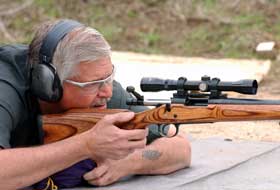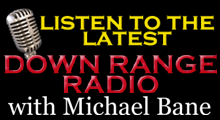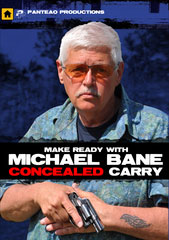skip to main |
skip to sidebar
THE NEW SURVIVAL GUNS — An Introduction
As promised, Ver. 1.0 of the Intro...
INTRODUCTION
The More Things Change…
Back in the mid-1970s, not long before then-President Jimmy Carter in his cardigan sweater took to the airwaves to bemoan the new American “malaise,” a banker-turned-writer named Mel Tappan began one of the most successful firearms books ever written with these words:
“Why, in this age of the urban, industrial, interdependent society, would anyone write a book on guns for survival use — or, perhaps more to the point, why would anyone want to read it?”
That book, SURVIVAL GUNS, has remained in print for more than 30 years and, along with the writings of the late Col. Jeff Cooper, was a primary influence on a whole generation of shooters. Mel Tappan plugged into a nerve that at the time most people had either forgotten or were just beginning to remember, the sense that perhaps the inevitability of greater days ahead for the most powerful nation on earth was not nearly as certain as we’d been led to believe. We were reeling from the one-two punch of the 1960s, the vestiges of which linger still, and our humiliating withdrawal from Vietnam, culminating in the nationally televised fall of Saigon in 1975. Americans had been pounded in the OPEC-driven gas crisis — for the first time since World War 2 facing long lines and rationing for what was considered a national birthright — suffered our first post-Great Depression stock market crash and were being merciless ground in the nation’s first peacetime inflation, making, as Brad DeLong of the National Bureau of Economic Research noted, “…every business decision a speculation on monetary policy.”
Briefly put, we were afraid in a way that this generation of Americans had never been afraid before, and, worse, we feared on a gut level that we had lost control of the great machine that was the United States.
“Without really being aware of it,” wrote Tappan, “most of us have subcontracted almost all our life support activities to other people, corporations, governmental bodies and machines. Not only does this circumstance contribute to the sense of frustration which is symptomatic of modern man, it is life-threatening should there be an interruption in those vital services. We need only project ourselves into a natural disaster, a shipwreck or a riot to realize just how dependent we have become on the uninterrupted functioning of the social order merely to stay alive.”
What followed Tappan’s words was not the much-feared next Great Depression, but a stunning 30-year roller coaster ride through Affluence Land, an unanticipated and unplanned remaking of the world through the technological miracle of lowly silicon, the eighth most common element in the universe. In an interconnected, Internet-driven, YourSpace, FaceBook, Twitter, 24/7 overheated atmosphere, it was easy to forget Tappan’s almost quaint warning…not only had we subcontracted almost all our live support to other people, corporations, governmental bodies and machines, we were now doing so at Internet speeds. Our world became sleek, streamlined and global, without much thought to the implications. For even the smallest one-person business, supply lines began to stretch across the world…it didn’t matter where you worked, the mantra went, because we were all connected in instantaneous communication and the greatest transportation web in the history of mankind.
The mantra was reflected in our largest businesses as well, whether manufacturing or service or intellectual…the world began, to borrow a phrase from economic analysts Thomas Friedman, “flattening out.” Businesses moved from the old “inefficient” model of maintaining costly “gotta” inventories — gotta store ‘em; gotta count ‘em; gotta throw some away when we change the spec — to “just-in-time.” Instead of a warehouse full of products, for example, waiting to be restocked on store shelves, the products arrived at the store from suppliers “just-in-time,” just hours or even minutes before the shelves ran dry. For American manufacturers, the combination of instant communication, globalization and just-in-time was a godsend, allowing a long chain of supplies from all over the world, usually wherever the supply could be made most cheaply, flowing into factories just in time to be assembled into the newest consumer product.
The American economy prospered at a level that couldn’t even be imagined in the era of Jimmy Carter’s malaise…what could possibly go wrong?
At the same time, we emerged from the Cold War — our game of brinksmanship with a counterpart superpower, the USSR — to a newer, vaguer and infinitely more dangerous battlefield with an enemy we are still struggling to understand. Until the rise of radical Islam, we understood war as defined by Prussian general Carl Von Clausewitz in the early part of the 19th Century, an extension of diplomacy by other means. “War is not merely a political act, but also a real political instrument, a continuation of political commerce, a carrying out of the same by other means,” Clausewitz wrote in On War.
Wars sought not to completely overthrow an enemy, but were fought for one of two reasons, to gain specific limited goals — land, resources, sometime populations — or to disarm an enemy and leave him militarily or politically helpless.
While Clausewitz’ writings (and those of the other great military strategists) foreshadowed the world-wide conflicts to come, they left us uniquely unprepared for a different nihilistic view of war, a throwback to older, perhaps more darkly violent, times. Radical Islam doesn’t seek our lands, our resources or our Western lifestyle, nor does it seek to render us helpless. Rather, by the admissions of its leaders, radical Islam seeks the destruction of Western culture and us along with it. It’s a hard concept to get our Western minds around…I’m always reminded of the scene in the alien invasion movie Independence Day, where as U.S. President actor Bill Paxton finally is able to ask one of the alien invaders what they wanted us to do. “Die,” replied the alien.
The terrorist attacks of 9-11 ultimately redefined Americans view of America, a punctuation mark between our older, safer world and the dangerous, and dangerously unpredictable, landscape of the future. Add to that two long-running wars, multiple contested elections and a viciously poisonous atmosphere in Washington D.C., an endless media drumbeat of overheated disasters from climate change, financial systems teetering on the verge of collapse, exploding stock market bubbles, the “safe nest egg” of real estate collapsing and as perhaps the final nail in America’s confidence, the spectacle of New Orleans in the grip of Hurricane Katrina, a major American city descending into anarchy as the whole country followed breathlessly on 24/7 news and Internet feeds. All the governmental “safety nets” supposed in place sagged and eventually ripped apart as people, American citizens, struggled and died in the relentless floodwaters. Local government’s response to the spreading disaster was to order all private weapons seized even as murderous gangs ran rampant, and for the first time America was treated to the television spectacle of heavily armored National Guard troops seizing firearms from grandmothers.
The answer to Mel Tappan’s original question — ““Why, in this age of the urban, industrial, interdependent society, would anyone write a book on guns for survival use…or, perhaps more to the point, why would anyone want to read it?” — now seems self-evident.
The irony is that we and our society is now so thoroughly interconnected, so thoroughly bound together in a communications/entertainment/information/stuff web that just a few years back would have seemed the exclusive province of science fiction that we no longer understand, or even see, those connections. Our society has become seamless and we no longer notice the strange noises coming from behind the curtain of the great and powerful Wizard of Oz. One of the my favorite examples of this loss of perspective is an email to a friend of mine, challenging him on his love of hunting. “That is so sick,” the email read. “Why can’t you just get your meat from the grocery store, where it comes from?”
Meat, vegetables, all kinds of food, sanitation, security, information, services of all sorts come from...somewhere else...the grocery store, the supermarket, the internet, the government, the garbage “man,” some entity who sole function is to provide. And while, as adults — well, ostensibly adults — we understand that behind the provider is a long chain of...something, we’re a little vague on what that something is or how it all comes together to deliver a Big Mac, fries and a 24-hour-a-day Twitter feed. To use another analogy, while we are certain the neck bone is connected to the foot bone, we’re not sure whether that connection is bone, rubber bands or magic. Nor do we particularly care.
Which is just spiffy as long as everything works, for lack of better words, to spec. We live and function in the most complex society in human history, and it works just fine...until it doesn’t. The problem with complexity is that it is complex — a lot of things have to happen in a very specific sequence, a dance, if you will, for 100 bottles of aspirin to arrive at your local Wal-Mart at the exact moment the last bottle walks out the door in your reuseable, environmentally sound, all-green grocery bag. Multiple that sequence by a thousand, by tens of thousands, by millions of transactions for a modern city to function day-to-day and you start to get a sense of the fragility of modern life.
That fragility only becomes apparent when a link in the chain breaks.It doesn’t actually matter what causes the break — a storm, a plane crashing onto a building, an unpopular court decision, a revolution in a country whose name we’re not sure how to pronounce correctly. When one link of the chain breaks, the entire chain is now at risk...and somewhere at the end of that chain are you and your family.
Which brings us to this book.
It turns out that, yes indeed, we are responsible for our own safety. Despite protestations of the rising Nanny State, the “guarantees” of state, local and federal government, the best efforts of law enforcement officers, nothing much has changed since February 25, 1525 where, in the battle for Pavia in northern Italy a peasant army described as “rabble” and armed with hand-connones slaughtered the French Mounted Horse, the cream of knighthood and the Age of Chivalry. It was the first, but not the last, time the individual firearm became known as the equalizer, the only way for the peasants to throw off the hundreds of years-old shackles of the brutal knights and their invincible armored war “machines,” the great destriers that were, in effect, the medieval equivalent of tanks.
I recently did a guest appearance on a History Channel special titled AFTER ARMAGEDDON. The show addressed the consequences of a pandemic influenza epidemic, focusing on a family in suburban Los Angeles. One of the questions I was asked in my capacty as an expert in firearms and self-defense was about the “veneer” of civilization. Under the hellish pressure of collapsing resources and rising death tolls, how long would human behavior remain “civilized” by the standards we recognize today?
My answer was that it took four days for New Orleans to descend into anarchy. “You’d have thought,” I added, “the veneer would be a little thicker.”
When we peak behind the curtain of the great and powerful Wizard of Oz, we don’t like what we see. I believe that if we sit down, take a deep breath and analyze the world we live in, if we are honest with ourselves we musty take steps to protect both ourselves and those under our care.
This book is not a comprehensive guide to preparedness, if there is any such thing. When we produced THE BEST DEFENSE/SURVIVAL, the first television series to ever address these concerns, we were initially overwhelmed with the sheer amount of information. At the end of this book, there’s a reading list that’ll help you get started.
This book is about the primary tool for self-defense, the firearm, and what you need to know to make intelligent decisions about guns, training, self-defense and personal responsibility. Parts of this book will be controversial, and I can guarantee you there will be parts you don’t agree with.
If it makes you think, it has accomplished the job I set out to do.






14 comments:
How do you get an entire book out of the subject?
Ammo + AK47 + Mossberg 590A1 + Glock 19 = entire subject.
Good read Mr. Bane. Can't wait to pick up the finished book !
As a sidebar...a year ago I watched Pat Buchanan describe on CSPAN the "process" he goes thru in writing his books. Manila folders, post it notes, back and forth with researchers, etc etc.
It would be a great blog post to read if you took us behind the curtain of a prolific writer and described how you give birth to a book.
Mr Bane, do you have a publish date yet? Sounds like a great read with excellent information from a man who has spent years on research. I'm excited to read and learn!
Excellent post.
""There are two spiritual dangers in not owning a farm. One is the danger of supposing that breakfast comes from the grocery, and the other that heat comes from the furnace." - Aldo Leopold
I'm looking forward to the release.
Small editorial note, Bill Pullman played the POTUS in Independence Day, rather than Bill Paxton.
Cheers!
John
Michael,
The comment you made in After Armageddon was the most on point in the show. "Normal" people do not seem to understand that it only takes one, yes one, day without water before a person's judgment becomes cloudy. After two days most people will "do whatever it takes" to get water and survive, especially if they have families to protect. No man is going to sit and watch his daughter die if there is water down the street at the big house on the corner.
BTW, did you see that FoxNews poll? 79% of Americans now believe the US could go bankrupt. Maybe we are beginning to get it.
it amazing what the masses donn't get.a AK and ammo.me and my glock. what I come away with is this PERSON neverwill read tappan's book.BUT just flap their gums. Dude there is so much more than your ak [& a poor choice]or your glock. what about small game hunting,rodents in the crops or in the basement.the list goes and on. i would like something to reachout pass fort mudge,as well as a 10/22read the book. if atool can do so.but save the flapping for the birds.also try tappan on survival
It is amazing what the masses donn't get.a AK and ammo.me and my glock. what I come away with is this PERSON never will read tappan's book.BUT just flap their gums. Dude there is so much more than your ak [& a poor choice]or your glock. what about small game hunting,rodents in the crops or in the basement.the list goes and on. i would like something to reachout pass fort mudge,as well as a 10/22read the book. if a tool can do so.but save the flapping for the birds.also try tappan on survival
StayAt Hotel Apartments is just what it sounds like – spacious apartments with fully equipped kitchenettes for people travelling in business or pleasure or both.
Cologne Hotels
In my opinion everyone must look at it.
Thanks so much for your post, pretty helpful information.
Crime is increasing day by day and it become important that we should aware about guns training, self-defense and personal responsibility to protect our family and ourselves. This book really help us.
________________
MA Firearms Safety Course
Hi Michael, regarding your Survival Guns post wanted to let you know I am selling my domain name SurvivalGuns.com in case you were interested. It's a valuable and rare domain I'm selling for just $300.
thanks,
Ed
ehoey@maine.rr.com
I want to buy a survival guns. One that is not so expensive.
Post a Comment